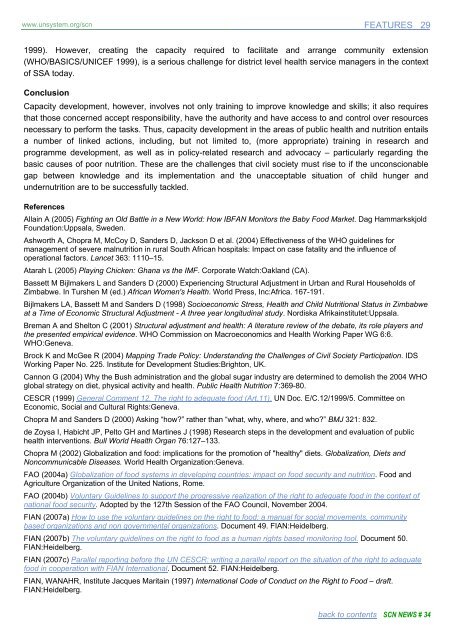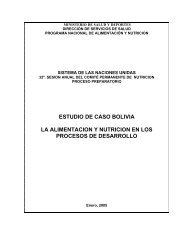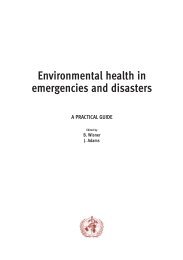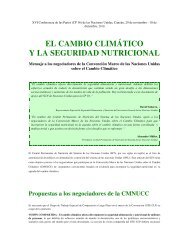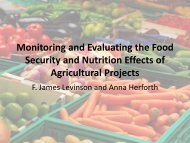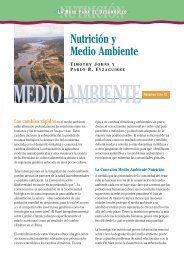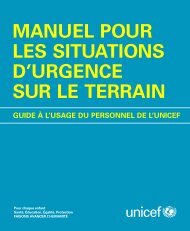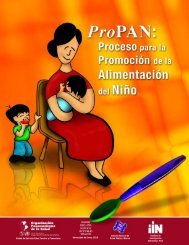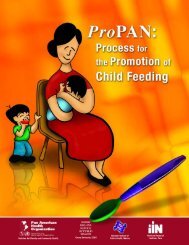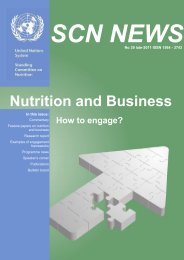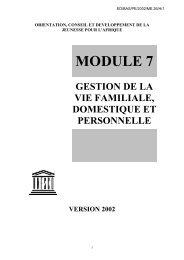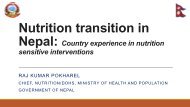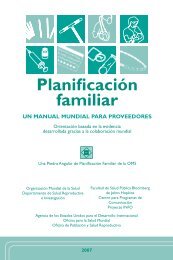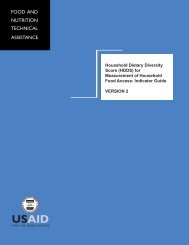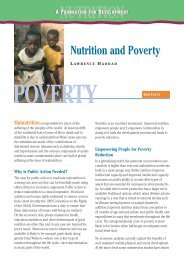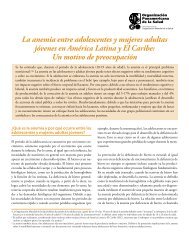SCN News No 34 - UNSCN
SCN News No 34 - UNSCN
SCN News No 34 - UNSCN
You also want an ePaper? Increase the reach of your titles
YUMPU automatically turns print PDFs into web optimized ePapers that Google loves.
www.unsystem.org/scn FEATURES 29<br />
1999). However, creating the capacity required to facilitate and arrange community extension<br />
(WHO/BASICS/UNICEF 1999), is a serious challenge for district level health service managers in the context<br />
of SSA today.<br />
Conclusion<br />
Capacity development, however, involves not only training to improve knowledge and skills; it also requires<br />
that those concerned accept responsibility, have the authority and have access to and control over resources<br />
necessary to perform the tasks. Thus, capacity development in the areas of public health and nutrition entails<br />
a number of linked actions, including, but not limited to, (more appropriate) training in research and<br />
programme development, as well as in policy-related research and advocacy – particularly regarding the<br />
basic causes of poor nutrition. These are the challenges that civil society must rise to if the unconscionable<br />
gap between knowledge and its implementation and the unacceptable situation of child hunger and<br />
undernutrition are to be successfully tackled.<br />
References<br />
Allain A (2005) Fighting an Old Battle in a New World: How IBFAN Monitors the Baby Food Market. Dag Hammarkskjold<br />
Foundation:Uppsala, Sweden.<br />
Ashworth A, Chopra M, McCoy D, Sanders D, Jackson D et al. (2004) Effectiveness of the WHO guidelines for<br />
management of severe malnutrition in rural South African hospitals: Impact on case fatality and the influence of<br />
operational factors. Lancet 363: 1110–15.<br />
Atarah L (2005) Playing Chicken: Ghana vs the IMF. Corporate Watch:Oakland (CA).<br />
Bassett M Bijlmakers L and Sanders D (2000) Experiencing Structural Adjustment in Urban and Rural Households of<br />
Zimbabwe. In Turshen M (ed.) African Women's Health. World Press, Inc:Africa. 167-191.<br />
Bijlmakers LA, Bassett M and Sanders D (1998) Socioeconomic Stress, Health and Child Nutritional Status in Zimbabwe<br />
at a Time of Economic Structural Adjustment - A three year longitudinal study. <strong>No</strong>rdiska Afrikainstitutet:Uppsala.<br />
Breman A and Shelton C (2001) Structural adjustment and health: A literature review of the debate, its role players and<br />
the presented empirical evidence. WHO Commission on Macroeconomics and Health Working Paper WG 6:6.<br />
WHO:Geneva.<br />
Brock K and McGee R (2004) Mapping Trade Policy: Understanding the Challenges of Civil Society Participation. IDS<br />
Working Paper <strong>No</strong>. 225. Institute for Development Studies:Brighton, UK.<br />
Cannon G (2004) Why the Bush administration and the global sugar industry are determined to demolish the 2004 WHO<br />
global strategy on diet, physical activity and health. Public Health Nutrition 7:369-80.<br />
CESCR (1999) General Comment 12. The right to adequate food (Art.11). UN Doc. E/C.12/1999/5. Committee on<br />
Economic, Social and Cultural Rights:Geneva.<br />
Chopra M and Sanders D (2000) Asking “how?” rather than “what, why, where, and who?” BMJ 321: 832.<br />
de Zoysa I, Habicht JP, Pelto GH and Martines J (1998) Research steps in the development and evaluation of public<br />
health interventions. Bull World Health Organ 76:127–133.<br />
Chopra M (2002) Globalization and food: implications for the promotion of "healthy" diets. Globalization, Diets and<br />
<strong>No</strong>ncommunicable Diseases. World Health Organization:Geneva.<br />
FAO (2004a) Globalization of food systems in developing countries: impact on food security and nutrition. Food and<br />
Agriculture Organization of the United Nations, Rome.<br />
FAO (2004b) Voluntary Guidelines to support the progressive realization of the right to adequate food in the context of<br />
national food security. Adopted by the 127th Session of the FAO Council, <strong>No</strong>vember 2004.<br />
FIAN (2007a) How to use the voluntary guidelines on the right to food: a manual for social movements, community<br />
based organizations and non governmental organizations. Document 49. FIAN:Heidelberg.<br />
FIAN (2007b) The voluntary guidelines on the right to food as a human rights based monitoring tool. Document 50.<br />
FIAN:Heidelberg.<br />
FIAN (2007c) Parallel reporting before the UN CESCR: writing a parallel report on the situation of the right to adequate<br />
food in cooperation with FIAN International. Document 52. FIAN:Heidelberg.<br />
FIAN, WANAHR, Institute Jacques Maritain (1997) International Code of Conduct on the Right to Food – draft.<br />
FIAN:Heidelberg.<br />
back to contents <strong>SCN</strong> NEWS # <strong>34</strong>


